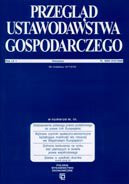Przegląd Ustawodawstwa Gospodarczego nr 7/2013
Rok wydania: 2013
Miejsce wydania: Warszawa
Oprawa: miękka
PRZEGLĄD USTAWODAWSTWA GOSPODARCZEGO 7/2013
Spis treści
Joanna Sieńczyło-Chlabicz, Uniwersytet w Białymstoku
Zofia Zawadzka, Uniwersytet w Białymstoku
Patent europejski o jednolitym skutku. Konsekwencje przyjęcia jednolitego systemu ochrony patentowej
Summary
The European patent with unitary effect. Effects of adopting the unitary system of patent protection
Regulations referring to the institution of European patent with unitary effect are not perfect. Simultaneously, however, the union solutions proposed are the simplest and, as to costs, the most effective way of implementing the solutions connected with the unitary patent protection without a necessity of forming a competent patent organisation ex nihilo. Those who benefit from implementing the unitary patent protection will be foremost businesspeople who possess innovative solutions and search for patent protection at least in a few states of the European Union. They will save time and avoid expenses connected with the necessity of being charged by national patent offices for patent applications, search, research, publications, patent maintenance etc.
On the other hand, it is doubtless that the consequences of the patent packet will not be beneficial for Poland. One of basic reasons is the enormous disproportion between the state of innovation in Poland and the technologically highly developed countries. The savings resulting from the elimination of translation of unitary patents will foremost fall on the businesspeople obtaining the highest number of patents and coming from the countries where the official language is English, French or German. This will happen at the cost of Polish small and medium-sized enterprises.
Bartłomiej Nowak, Kozminski University
Gas system operator as an entity safeguarding the security of supply to the recipients
Streszczenie
Operator system gazowego jako podmiot zabezpieczający ochronę dostawy do odbiorców
Zgodnie z ideą unbundlingu działania w zakresie przesyłu i dystrybucji powinny być wykonywane przez niezależne podmioty – operatorów systemu. Operatorzy powinni być niezależni od innych form działalności, nie związanych bezpośrednio z przesyłem lub dystrybucją, czyli produkcją i sprzedażą, tak aby nie zachodził konflikt interesu i nie zostały naruszone reguły konkurencji, szczególnie w zakresie dostępu do sieci. W związku z powyższym operatorzy powinni posiadać wszelakie kompetencje do zapewnienia niedyskryminacyjnego i swobodnego dostępu dla wszystkich sprzedawców (stron trzecich) do infrastruktury gazowej. W tym kontekście transparentny dostęp dla sprzedawców gazu do infrastruktury sieciowo-magazynowej będący rezultatem liberalizacji jest niezbędnym warunkiem rozwoju bezpiecznego systemu dostaw gazu do konsumentów w poszczególnych krajach Unii Europejskiej. Swobodny i niezagrożony dostęp dla sprzedawców znacząco zwiększa spektrum wyboru dla klientów.
Maciej Rudnicki, Katolicki Uniwersytet Lubelski Jana Pawła II
Kamila Sobieraj, Katolicki Uniwersytet Lubelski Jana Pawła II
Unijne warunkowania prawne dotyczące wdrażania krajowych systemów wsparcia w zakresie redukcji kosztów emisji pośrednich
Summary
European Union legal conditionings relating to the implementation of national supporting systems in the field of reducing the costs of indirect emissions
The aim of taking up the subject area presented in the article is analyzing the European Union legal regulations and guidelines relating to constructing the national supporting systems for energy-consuming sectors in the field of reducing the costs of indirect emissions. The authors pointed out that following the Commission’s guidelines, the condition of the lack of full compensation and decreasing character of the compensation as a form of support for industries endangered with phenomenon of the emissions indirect escaping, as well as not involving all sectors considered subject to escaping emissions in the compensatory system endangers the competitiveness of European Union countries’ markets and contradicts EU ETS directive’s objectives. Such restrictions can have particularly negative effects for the Polish economy and endanger proper functioning of Polish energy-consuming sectors. The authors make postulates regarding activities that should be taken by Polish authorities, including the Polish legislator, to prevent such risks.
Z praktyki gospodarczej
Tomasz Szczurowski, Uniwersytet Kardynała Stefana Wyszyńskiego
Zakres kognicji sądu w postępowaniu rejestrowym
Summary
Scope of the court’s cognition in the registry procedure
This article describes problems connecting with scope of the cognition of the registry court. This problem is analyzed in view of business name especially limited partnership and a limited joint-stock partnership, contribution, object of the company's and resolution. It is definitely important subject for people who undertake a business activity, because they should know what can be control by the registry court and how deep this audit can be. They must be aware of the competences of the registry court.
The author suggests that the registry court has full cognition in all this topics, because there are not rules which can exclude some of them from jurisdiction of this court.
| Kurier Inpost | 14 zł |
| Kurier FedEX | 14 zł |
| Inpost Paczkomaty | 14 zł |
| Odbiór osobisty | 0 zł |
| Darmowa dostawa | od 250 zł |
| Darmowa dostawa w Klubie Książki | od 200 zł |


